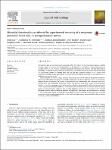Microbial functionality as affected by experimental warming of a temperate mountain forest soil—A metaproteomics survey
Liu, Dong
Keiblinger, Katharina M.
Schindlbacher, Andreas
Wegner, Uwe
Sun, Hanyin
Fuchs, Stephan
Lassek, Christian
Riedel, Katharina
Zechmeister-Boltenstern, Sophie
Soil microbes play an important role in terrestrial carbon (C) cycling, but their functional response to global warming remains yet unclear. Soil metaproteomics has the potential to contribute to a better understanding of warming effects on soil microbes as proteins specifically represent active microbes and their physiological functioning. To quantify warming effects on microbial proteins and their distribution among different functional and phylogenetic groups, we sampled forest soil that had been artificially warmed (+4 °C) during seven consecutive growing seasons and analyzed its metaproteomic fingerprint and linked to soil respiration as a fundamental ecosystem service. Bacterial protein abundances largely exceeded fungal abundances at the study site but protein abundances showed only subtle differences among control and warmed soil at the phylum and class level, i.e. a temperature-induced decrease in Firmicutes, an increase in Agaricomycetes and Actinobacteria, and a decrease in the Asco/Basidiomycota ratio. Community function in warmed soil showed a clear trend towards increased proteins involved in microbial energy production and conversion, related to the increased CO2 efflux from warmed soil as a result of stress environmental conditions. The differences in community function could be related to specific phyla using metaproteomics, indicating that microbial adaptation to long-term soil warming mainly changed microbial functions, which is related to enhanced soil respiration. The response of soil respiration to warming (+35% soil CO2 efflux during sampling) has not changed over time. Accordingly, potential long-term microbial adaptations to soil warming were too subtle to affect soil respiration rates or, were overlaid by other co-varying factors (e.g. substrate availability).
No license information

